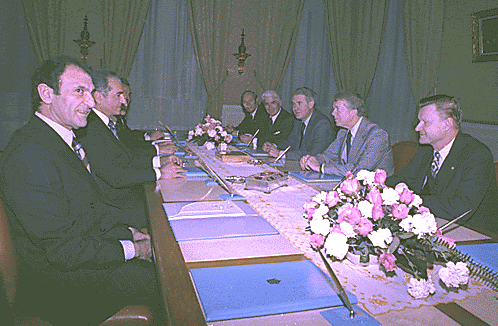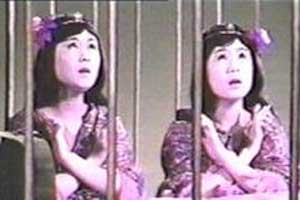
TranceAddict Forums (www.tranceaddict.com/forums)
- Political Discussion / Debate
-- Hugo...doing it again.
Pages (21): « 1 2 3 4 5 6 7 8 9 10 11 12 13 14 15 16 17 [18] 19 20 21 »
| quote: |
| Originally posted by George Smiley The problem is Shakka, if Chavez is a dictator, what is the solution if the people vote for him? |
| quote: |
| Originally posted by Shakka I guess one possible answer is, it's not my fucking problem. Usually dictatorships end in violent revolt. Maybe that'll be the solution, but who knows how long it could take. |
| quote: |
| Originally posted by George Smiley Socialism = economic equality = equality of opportunities There is NO equality of opportunity under capitalism Do you not understand that in a capitalist society, the more wealth you have the more opportunities you have. As capitalism requires an unequal distribution of wealth, that equates into an unequal distribution of equality. Economic freedom does not, and never will, lead to equal opportunities (economic equality). Economic freedom means individuals are allowed to consolidate wealth at the expense of other individuals in society. This gives the wealthier individuals more opportunities in life than those with less wealth. Socialist polices aim to offset that phenomena by redistributing wealth more evenly (yes, through taxation) so that those less wealthy individuals can still have the same amount of opportunities as those at the weathiest echlons of society. For example, education standards at state schools will be as high as at private schools. Under capitalism, if a rich person and a poor person need a kidney transplant, the rich person will get one because they can afford it. Under free health care they both get a kidney transplant because they both have equal opportnities... |
| quote: |
| Originally posted by Fir3start3r Did you ever stop to think that people don't deserve to be all equal? For example, why should a hard working small business owner have to pony up for the sloth that doesn't contribute to society at all? How exactly is that, 'fair'? In a text-book-Star Trekkie-Utopia, socailism sounds great, however human nature just doesn't work that way. |
| quote: |
| Originally posted by Fir3start3r In a text-book-Star Trekkie-Utopia, socailism sounds great, however human nature just doesn't work that way. |
Does this give anyone else the warm fuzzies?


I win!





Not so fast!


Nah they're poor!
I pull out my top trump: Bobbie Mugabe!


| quote: |
Originally posted by LazFX  |
Mr. Carter with authoritarian Shah Mohammad Reza Pahlavi.. before the Iranian Revolution..


This is after the CIA sponsored a coup against the DEMOCRATICALLY ELECTED PRIME MINISTER Mohammed Mossadegh, who became popular after nationalizing the oil industry, then monopolized by Britains Anglo-Persian Oil company, now BP. Mess with US/UK oil, and get couped or bombed..
| quote: |
| Originally posted by Lebezniatnikov No offense, but Mothra isn't even in the same league as those others. |

| quote: |
| Originally posted by LazFX no offense taken,  |

| quote: |
| Shutting Up Venezuela’s Chávez By ROGER COHEN Published: November 29, 2007 CARACAS, Venezuela Roger Cohen It was a fascist general in 1930s Spain who coined the phrase “Viva la muerte!” or “Long live death!” Essentially meaningless, the words captured the cult of soil, blood and savagery that coursed through European Fascism, in its Francoist and other forms. President Hugo Chávez of Venezuela hates fascists; they are central to his repertoire of insults. But he has not hesitated to deploy the imagery of death to bolster his leftist brand of petro-authoritarianism, now operating under the ludicrous banner of “Fatherland, Socialism or Death!” The slogan looks almost quaint in its anachronism. Chávez would no doubt claim Cuban revolutionary, rather than Spanish fascist, roots for it (Fidel Castro also invoked fatherland and finality). The bottom line is this: Latin America’s oil-gilded caudillo is getting serious about ruling for life, just like Franco and Castro. I might add Vladimir Putin to that list. Like the Russian leader, Chávez has already used gushing oil revenue, a pliant judiciary, subservient institutions and the galvanizing appeal of vitriolic anti-Americanism to concoct a 21st-century, gulag-free authoritarianism. But even Putin has not contemplated going as far as Chávez now intends to take his “Bolivarian revolution.” Venezuelans will vote Sunday in a referendum that would remove all limits on presidential re-election, grant Chávez direct control over foreign currency reserves, allow him to censor the media under a state of emergency declarable at his discretion, expand his powers to expropriate private property and create the second formally socialist nation in the Americas alongside Fidel’s. “The measures amount to a constitutional coup,” said Teodoro Petkoff, who edits an opposition newspaper. Certainly, they would prod Venezuela from an oppressive rule comparable to Mexico’s under its once impregnable Institutional Revolutionary Party toward the dictatorial absolutism of Cuba. Unlike other votes during Chávez’s nine-year presidency, and unlike the assured victory of Putin’s United Russia Party in voting the same day, the referendum is not a foregone conclusion. Overcoming inertia, opponents led by students have energized a “No” campaign. A general once close to Chávez has denounced a looming coup d’état. Polls suggest a close outcome. But awash in petrodollars — oil accounts for about 90 percent of Venezuelan exports — Chávez commands formidable resources. They are centered in the armed forces; a huge nomenklatura scattered across the bureaucracy and newly nationalized industries; the so-called Boliburgesía (Bolivarian bourgeoisie) of traders grown rich working the angles of a corrupt system; and the poor whom Chávez has helped and manipulated. Certainly, the oil money Chávez has plowed into poor neighborhoods (at the expense of an oil industry suffering chronic underinvestment) has reduced poverty. The United Nations Economic Commission for Latin America said last year that the extreme poverty rate had fallen to 9.9 percent from 15.9 percent. But more than spreading socialist ideals, Chávez has spread a form of crony capitalism, dedicated to his greater glory, that has imbued the economy with all the resilience of a house of cards. Foreign investment has plunged, scared off by nationalizations. A huge disparity between the official and black-market exchange rates has encouraged get-rich-quick schemes for favored “Chávistas” while erecting endless barriers to trade. Price controls on staples have made eggs unavailable. This week, you can’t find chickens. Chávez’s socialism delivers subsidized gasoline and glittering malls but no milk. Latin America has been here before, with the disastrous import-substitution and highly regulated models of the 1960s and ’70s. Most of the region has moved on, but not Chávez, who trumpets “growth from within,” whatever that is. The World Bank’s recently released “Doing Business 2008,” a ranking of the ease of conducting commerce, places Venezuela 172nd out of 178 countries. Despite this, the country does huge business with the United States, as its fourth-largest crude oil supplier and a big importer. Chávez’s “socialism” and his chumminess with Iran’s Mahmoud Ahmadinejad do not extend to cutting off the “imperialist empire.” Chávez is too shrewd to sever his lifeline. A possible conclusion would be that he’s harmless — a wily barracks-bred buffoon whose leftist rhetoric is just a veneer for a petrodollar power play. Perhaps that’s why the United States — and Latin American nations — have been so muted, or silent, before Chávez’s attempted “constitutional coup.” Oil speaks. But Chávez’s grab for socialist-emperor status is grotesque and dangerous — as Fascism was — a terrible example for a region that has been consolidating democracy. King Juan Carlos of Spain got it right when he recently interrupted Chávez’s trademark verbal diarrhea with a brusque: “Why don’t you just shut up?” Venezuelans should watch that regal routine on YouTube — it’s even been set to music — and follow suit on Sunday. |
| quote: |
| Originally posted by George Smiley Glad you're not offended but don't think the same can be said for these two...  |

Wow......
| quote: | ||||||
Chavez calls Catholic cardinal who criticized him "...a thug, stupid, mentally retarded sycophant defender of dark interests.'' Then it gets interesting
and then Hugo Chavez accuses CNN of putting out a hit on him
and then this Hugo Chavez to private businesses: Stop opposing me or I'll take all your stuff
|
both of Presidente Uribes' parents were kidnapped and killed by the Guerillas when he was a child, explains the vendetta he has against them and the thousands of people that have disapeared under his regime and his hatred of Chavez because of his support for the FARC. Uribe has changed Colombia for the "better" (according to most of the middle and upper class) and presided over unpresidented stability in Colombia through his extremely tough stance against FARC, although ask anyone from the poverty stricken provinces their thoughts on Uribe and they will say his made Colombia much safer for the rich and ignored the misery and suffering of the poor.
Most of the middle and upper class in Bogota, Manizales, Medellin, Cartegena, et al, wont even acknowledge that a war is going on because its outside of their security bubble and the media is extremely pro Government and Paramilitary. Recently Uribe created an anmesty for certain Rogue "Government controlled and US funded" Paramilitary groups to pardon them for their ethnic cleansing, and displacement of hundreds of thousands of civilians (i've heard that Colombia has the largest internal refugee displacement crisis in the world larger than Iraq) and in return these factions have to throw down their weapons. However the majority of the government backed Paramilitary factions are still fighting the FARC over control over the Coca fields and ethnically cleansing civilians and forcing them off their land.
I've been near Colombian / Venezualan border on the Carribean coast and its extremely militarised with both the Ejercito (government army) and Paramilitary (who are seperate organisations that the governmen ttries but fails to keep on a leash but continues to fund them)but further down near Punto Mont in the on amazon is guerilla territory where they dare not tread.
The failed coup d’état of Hugo Chavez
[[ LINK REMOVED ]]
I wish we had a leader as dynamic as Chavez or Putin who have wide popular support.
| quote: |
| Originally posted by Krypton The failed coup d’état of Hugo Chavez [[ LINK REMOVED ]] I wish we had a leader as dynamic as Chavez or Putin who have wide popular support. |
| quote: |
| Originally posted by George Smiley Aye great documentary Tho I completely disagree about Putin! There's a difference between popular support and whipping up a frenzy of nationalism... |
| quote: |
| Originally posted by Krypton I didn't say Putin was a great guy, but he is a dynamic leader. |

| quote: |
| Originally posted by guerra-monstru You don't know anything about leadership  |
| quote: |
| Originally posted by guerra-monstru You don't know anything about leadership  |


| quote: |
| Originally posted by venomX Want to support that with some arguments there buddy? |
Powered by: vBulletin
Copyright © 2000-2021, Jelsoft Enterprises Ltd.